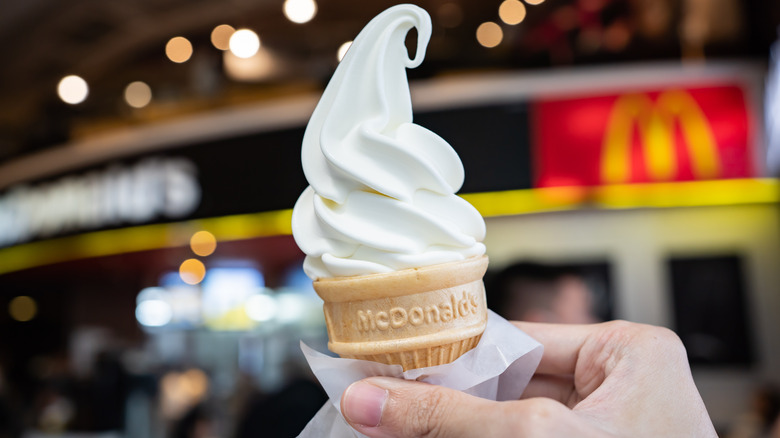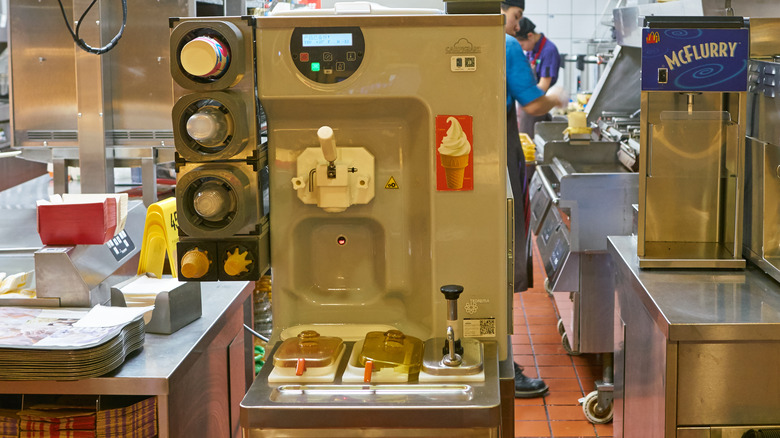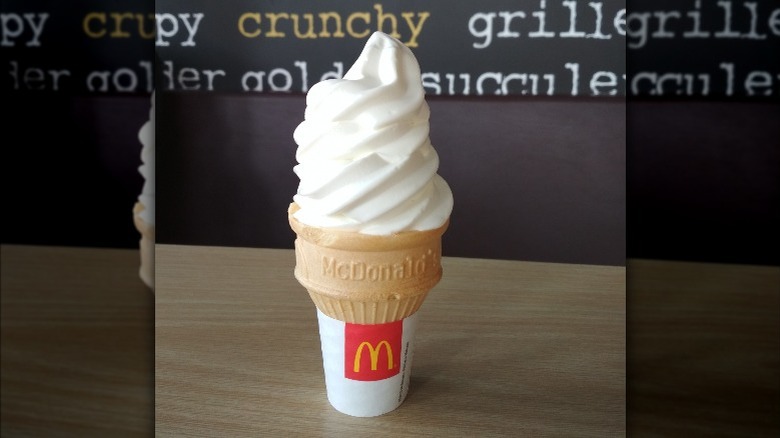What You Need To Know About McDonald's Latest Ice Cream Machine Lawsuit
McDonalds is known for having a mean soft-serve ice cream — if you can get it, that is, since its machines appear to often be broken. Functioning ice cream machines are so hard to find that one customer put it: "I'm beginning to wonder if this @McDonalds even has an ice cream machine. It's been 'broken' so long that I'm coming up with conspiracy theories at this point."
The machines' constant state of disrepair is so legendary that the U.S. Federal Trade Commission even reached out to the fast food chain's franchisees to find out what gives. Franchisees say, per The Wall Street Journal, that the ice cream makers are difficult to run and complicated to fix; they are programmed to go into an automatic heat-cleaning cycle that kills of bacteria every night — but when the cycle malfunctions, the soft-serve machines shut down until they can be repaired by a technician. Since the machines are said to be responsible for 60% of McDonald's dessert sales across the U.S., we understand why franchisees are antsy about the high maintenance machines.
Given all this, Kytch's device should have been the perfect high tech solution for frustrated franchisees who only wanted to serve ice cream, and after it came on the scene in 2019, it seemed to be just what the fast food employees ordered. The smart gadget could monitor the McDonald's machine to call out problems before they happened, reportedly saving operators thousands of dollars in fees and lost sales each month (via Wired). And life looked good for Kytch, until McDonald's told its franchisees to stop using the ice cream machine whisperers.
McDonald's didn't want franchisees to use Kytch's device
According to The Wall Street Journal and Wired, McDonald's had a list of reasons why it felt Kytch's gadgets shouldn't be used on the ice cream makers: they weren't "sanctioned" and voided warranties; they were a safety hazard; and the chain was working on its own device "with fully vetted partners" for the machines anyway, because as McDonald's put it, "Nothing is more important to us than delivering on our high standards for food quality and safety." Extreme Tech says McDonalds had also alleged that the gadget company was "intercepting the company's 'confidential information'," and that using the Kytch device could lead to injury.
As a result of those claims, Kytch is now suing McDonalds for $900 million in damages for false advertising and for getting involved in contracts that Kytch has with clients. Kytch co-founder Melissa Nelson tells Wired that: "They've [McDonald's] tarnished our name. They scared off our customers and ruined our business. They were anti-competitive. They lied about a product that they said would be released. McDonald's had every reason to know that Kytch was safe and didn't have any issues. It was not dangerous, like they claimed. And so we're suing them."
Kytch's gadget is unsafe: McDonalds
Kytch believes McDonald's doesn't have a legitimate reason to question the safety of its gadget. The tech company says its device is certified and meets Underwriter's Laboratory safety standards, and that McDonald's ice cream machine vendor, Taylor, had a reason to keep its ice cream makers broken. Per Wired, repair and maintenance contracts made up 25% of its revenues in 2018 alone. Kytch also believes Taylor had been involved in trying to reverse engineer its ice cream machine gadget, and because of that, it accused the company of theft of trade secrets back in May of last year.
McDonald's has not strayed from the position and are keeping Kytch out of the ice cream machines, telling Wired it "owes it to our customers, crew, and franchisees to maintain our rigorous safety standards and work with fully vetted suppliers in that pursuit." With both Kytch and McDonald's holding fast to their sides of the story, it may be a while before we find out how McDonald's intends to fix its ice cream problem, and why Kytch wasn't the company to do it for them.


